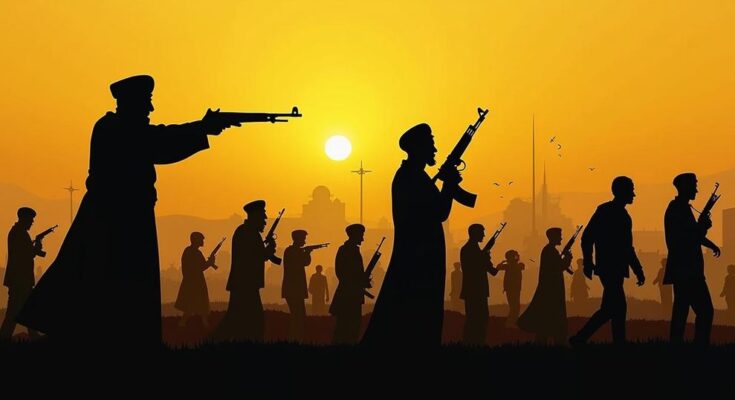Hassan Nasrallah, the leader of Hezbollah, was killed in an Israeli airstrike in Beirut, prompting a wide range of reactions from Middle Eastern leaders and organizations. The strike resulted in multiple casualties, including the deputy commander of Iran’s IRGC, with widespread condemnation and mourning declared in several countries, while the U.S. supported Israel’s actions as a form of justice. This event has intensified regional tensions and highlighted the complex web of geopolitical alliances.
Leaders and organizations across the Middle East have expressed their reactions following the death of Hezbollah’s leader, Hassan Nasrallah, who was reportedly killed on Friday during an Israeli airstrike targeting the southern suburbs of Beirut. The Israeli military conducted a significant operation, dropping approximately 80 bombs, including specialized munitions aimed at eliminating Nasrallah and other high-ranking officials who were allegedly convened at Hezbollah’s headquarters. The strike resulted in the deaths of at least 11 individuals, with 108 others sustaining injuries, as confirmed by Lebanon’s Health Ministry. In addition to Nasrallah, Abbas Nilforoushan, the deputy commander of Iran’s Islamic Revolutionary Guard Corps, was also among the casualties, marking a critical loss for Iran, which has been an ally of Hezbollah. Following the assault, Hezbollah released a statement commemorating Nasrallah as a “brave martyr,” highlighting his nearly three decades of leadership. Israeli officials characterized this military operation as a pivotal countermeasure, significantly undermining Hezbollah’s command structure. Israeli Defense Minister Yoav Gallant asserted, “This operation closed a long-standing reckoning with the master murderer Nasrallah.” Iran’s Supreme Leader, Ayatollah Ali Khamenei, condemned the assassination through a statement on his official website, urging Muslims to unite with Hezbollah against Israel, labeling them a “usurping and wicked regime.” Khamenei declared, “The fate of this region will be determined by the forces of resistance.” The Palestinian group Hamas condemned the act as a “cowardly act of terrorism,” while the Houthis in Yemen expressed that Nasrallah’s death would enhance their determination for resistance. Lebanon’s caretaker Prime Minister, Najib Mikati, announced a three-day mourning period, warning of imminent dangers to Lebanon. Former Lebanese President Michel Aoun lamented the loss of Nasrallah, praising his dedication to national resistance and asserting the need for unity in the face of ongoing Israeli aggression. In response to the assassination, Turkish President Recep Tayyip Erdogan criticized Israel’s actions without specifically naming Nasrallah, categorizing them as reckless and indicative of a disregard for human values. On the regional level, both Iraq and Syria declared three days of public mourning. Iraqi Prime Minister Mohammed Shia al-Sudani condemned the Israeli actions as a “criminal act,” while celebrations of Nasrallah’s death were reported in certain areas of Syria, showcasing the polarized views on the incident. From the United States, President Joe Biden described Nasrallah’s death as “a measure of justice for his many victims,” affirming support for Israel’s actions against Hezbollah and other Iranian-linked groups. Vice President Kamala Harris echoed this sentiment, emphasizing her commitment to Israel’s security and the need to counter Iranian-backed terrorist organizations.
Hassan Nasrallah, the leader of Hezbollah, has been a significant figure in the Middle East for nearly three decades, leading the group amid ongoing conflict with Israel. His leadership has been closely associated with Iran, which has supported Hezbollah both ideologically and militarily. The relations between Israel and Hezbollah have deteriorated over the years, leading to increased military confrontations. The recent Israeli airstrike that reportedly killed Nasrallah marks a pivotal moment, potentially altering the power dynamics within the region and provoking varied responses from various nations and groups.
The assassination of Hassan Nasrallah has provoked a spectrum of reactions across the Middle East, indicating the high stakes involved in Israel’s military actions against Hezbollah. While Israel celebrates the operation as a significant blow to Hezbollah’s leadership and strategy, regional responses highlight the complexities of alliances and the potential for heightened tensions and violence. The international implications, particularly concerning Iran’s reactions, further emphasize the precarious stability of the region, making it essential for leaders involved to navigate these turbulent waters carefully.
Original Source: www.al-monitor.com




